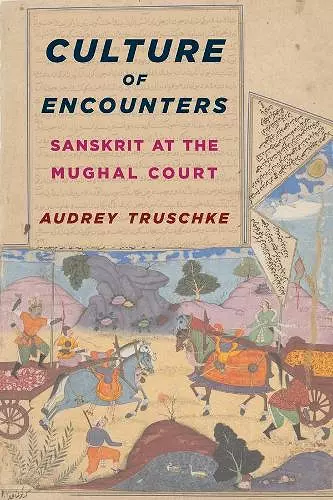Culture of Encounters
Sanskrit at the Mughal Court
Format:Hardback
Publisher:Columbia University Press
Published:1st Mar '16
Currently unavailable, and unfortunately no date known when it will be back

Culture of Encounters recasts the Mughal Empire as a polyglot polity that collaborated with its Indian subjects to envision its sovereignty. This study also reframes the development of Brahman and Jain communities under Mughal rule, which coalesced around carefully selected, politically salient memories of imperial interaction. Culture of Encounters certifies the critical role of the sociology of empire in building the Mughal polity, which came to irrevocably shape the literary and ruling cultures of early modern India.
Culture of Encounters recasts the Mughal Empire as a polyglot polity that collaborated with its Indian subjects to envision its sovereignty. This study also reframes the development of Brahman and Jain communities under Mughal rule, which coalesced around carefully selected, politically salient memories of imperial interaction.Culture of Encounters documents the fascinating exchange between the Persian-speaking Islamic elite of the Mughal Empire and traditional Sanskrit scholars, which engendered a dynamic idea of Mughal rule essential to the empire's survival. This history begins with the invitation of Brahman and Jain intellectuals to King Akbar's court in the 1560s, then details the numerous Mughal-backed texts they and their Mughal interlocutors produced under emperors Akbar, Jahangir (1605-1627), and Shah Jahan (1628-1658). Many works, including Sanskrit epics and historical texts, were translated into Persian, elevating the political position of Brahmans and Jains and cultivating a voracious appetite for Indian writings throughout the Mughal world. The first book to read these Sanskrit and Persian works in tandem, Culture of Encounters recasts the Mughal Empire as a polyglot polity that collaborated with its Indian subjects to envision its sovereignty. The work also reframes the development of Brahman and Jain communities under Mughal rule, which coalesced around carefully selected, politically salient memories of imperial interaction. Along with its groundbreaking findings, Culture of Encounters certifies the critical role of the sociology of empire in building the Mughal polity, which came to irrevocably shape the literary and ruling cultures of early modern India.
In Culture of Encounters, Audrey Truschke makes a compelling argument for the importance of Sanskrit and Sanskrit intellectuals in the Mughal court. Although certain aspects of these 'encounters' have been researched before, Truschke's work is more comprehensive, and her precise textual analyses go further than any others so far. This is an important and impressive work that should change the field of Mughal studies. -- Francesca Orsini, SOAS, University of London A remarkable achievement. Exploiting a substantial archive of Sanskrit materials, Truschke reveals a vibrantly multicultural Mughal court, one more thoroughly Indian than is commonly thought, owing to its close engagement with the land's oldest literary culture. -- Richard M. Eaton, University of Arizona Cultures of Encounter is a breakthrough in modern scholarship on the history and culture of South Asia. This absorbing account of the interaction of Persian and Sanskrit offers a powerful corrective to conventional one-sided narratives. -- Carl W. Ernst, University of North Carolina The benefits of this book make it richly worth the while of cultural historians of Mughal India and literary scholars of precolonial Persian, Sanskrit, and South Asian vernacular literatures. International Journal of Middle East Studies
- Winner of John F. Richards Prize in South Asian History, American Historical Association 2017
ISBN: 9780231173629
Dimensions: unknown
Weight: unknown
384 pages